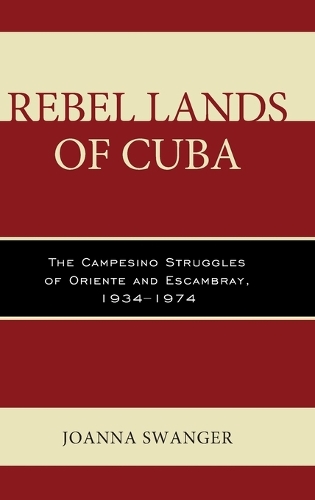
Rebel Lands of Cuba: The Campesino Struggles of Oriente and Escambray, 19341974
(Hardback)
Publishing Details
Rebel Lands of Cuba: The Campesino Struggles of Oriente and Escambray, 19341974
By (Author) Joanna Swanger
Bloomsbury Publishing PLC
Lexington Books
6th May 2015
United States
Classifications
Tertiary Education
Non Fiction
Revolutions, uprisings, rebellions
972.91063
Physical Properties
Hardback
324
Width 161mm, Height 234mm, Spine 26mm
590g
Description
The book is a comparative history of twentieth-century Cuban campesinos in two regions in Cuba marked by extreme differences in race, gender, and land tenure: Oriente and Escambray. It explores the ways these differences articulated with state formation from the pre-revolutionary period of 1934-1959 and then 1959-1974 and seeks to explain why campesinos in Escambray, having been active in the insurrection against Batista, later turned to stage a massive counter-revolution against the government headed by Fidel Castro. Although campesinos in both regions had been equally ignored by pre-1959 governments for different reasons, they developed two distinct understandings of what the role of the state should be in response to political neglect. Rich archival sourcesmany of which have not been accessed previouslydocument the unique shape of land struggles in each region in the 1930s through the 1950s. The author argues that because of the way race and gender and a collectivist land tenure tradition in Oriente mapped nicely onto the goals of the 1959 Revolution, Oriente became a kind of revolutionary showcase. In Escambray, on the other hand, a construct of white masculinity, tied to private property ownership, directly contravened the goals of the Revolution, which fueled the counter-revolution and also led to brutal state repression in the area.
Reviews
Rebel Lands of Cuba stands out on a number of levels.... Rebel Lands of Cuba is characterized by clear, accessible, and engaging prose and rests on an impressive amount of research, including Cuban archival records in Havana, Cienfuegos, Trinidad, and Santiago de Cuba.... Swanger makes a convincing case to explain the diverging trajectories of the two rebellious regions after 1959.... [I]t should be required reading for anyone interested not only in Cuban and Caribbean history, but also peasant studies, state formation, and (counter)revolution. * New West Indian Guide *
Swangers Rebel Lands of Cuba is a ground-breaking work on the history of the Cuban revolution. It is a truly original analysis grounded in regional archives, and revealing the distinct political economy and social fabric in Oriente and in the Escambray. Swanger's book demonstrates the contingency and competing definitions of 'revolution,' social reform, and counter-revolution. It makes a tremendous contribution to the historiography of the Cuban revolution and regional Cuban history. -- Jana Lipman, Tulane University
Swangers brilliantly-researched study documents and contrasts the fascinating revolutionary and counterrevolutionary stories of rural residents from Cubas most important coffee-producing regionsOriente in the East and Escambray in the West. She builds an extraordinarily convincing case that Orientes historical experience positioned collectively-organized peasants well to become a revolutionary showcase after 1959 whereas Escambray peasants embrace of traditional race, gender, and class hierarchies embodied in individualistic guajiro nationalism worked during and after the 1933 Revolution but proved to be their undoing after 1959. -- Gillian McGillivray, Glendon College, York University
Author Bio
Joanna Swanger is associate professor and director of the Peace and Global Studies Program at Earlham College.
